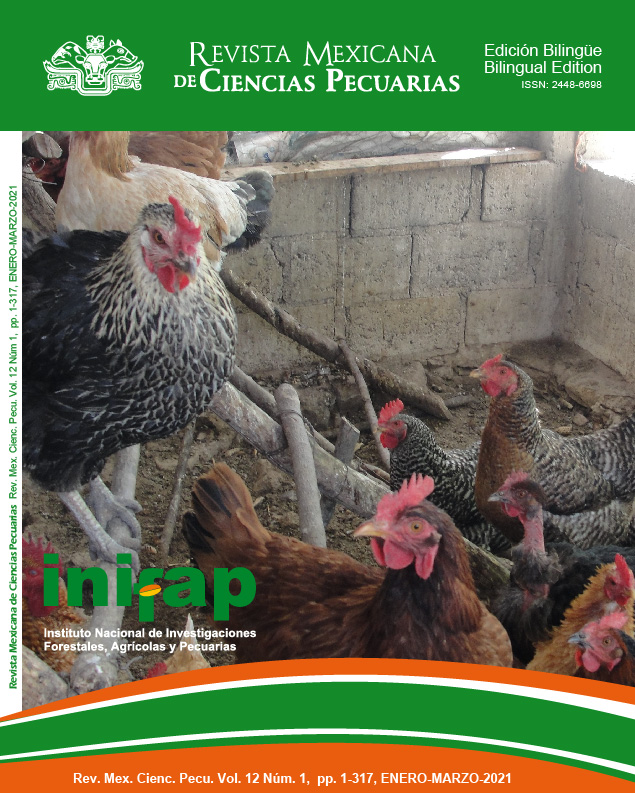Cognitive dissonance in the face of climate change in beekeepers: A case study in Mexico
DOI:
https://doi.org/10.22319/rmcp.v12i1.5213Keywords:
Adaptation, Perception, Attitude, Beekeepers, Apis melliferaAbstract
Climate change in beekeeping is perceived as a relational phenomenon, and it is necessary to adopt adaptation strategies to maintain economic activity. Festinger's theory of Cognitive Dissonance helps understand the constraints to the adoption of climate change adaptation strategies. For this purpose, a survey was applied to explore the relationship between the perception, attitude, and behavior of beekeepers in the face of climate change in Mexican territory. It was noted that: 1) Beekeepers identified climate change as the main problem for beekeeping; 2) They exhibit dissonance between their attitude and their behavior regarding adaptation strategies, and 3) Cognitive dissonance is reduced through justifications for their behavior. Thus, the present state of dissonance is a limitation for adopting climate change adaptation actions, evidencing the need to modify the behavior of beekeepers, through training to inform and explain the nature of climate change and its impacts; to place the beekeepers within this context, where they can contribute technical elements that may allow them to reorient their work, promoting an objective and constructive perception, which will generate a positive attitude in the face of the challenges that climate change represents, so that they may modify their behavior as much as necessary in order to keep the activity profitable in Mexico.
Downloads
References
Ocampo O. El cambio climático y su impacto en el agro. Rev Ing 2011(33):115-123. https://www.redalyc.org/articulo.oa?id=121022658012. Consultado: Jul 20, 2018.
Vergara W, Rios A, Trapido P, Malarín H. Agricultura y Clima Futuro en América Latina y el Caribe: Impactos sistémicos y posibles respuestas. Washington, D.C.: Banco Interamericano de Desarrollo. 2014:24.
Huerta G. La apicultura en el desarrollo. 2008:25-27.
FAOSTAT. Datos sobre alimentación y agricultura. Ganadería primaria/producción. FAO. 2019. http://www.fao.org/faostat/es/#data/QL. Consultado Feb 17, 2017.
Delgado DI, Eglee PM, Galindo-Cardona A, Giray T. Forecasting the influence of climate change on agroecosystem services: Potential impacts on honey yields in a small-island developing state. https://doi.org/10.1155/2012/951215 Psyche 2012:1-10. Accessed: Ago 14, 2018.
Smith WJ, Liu Z, Safi AS, Chief K. Climate change perception, observation and policy support in rural Nevada: A comparative analysis of Native Americans, non-native ranchers and farmers and mainstream America. Environ Sci Policy 2014;42:101-122. http://www.sciencedirect.com/science/article/pii/S1462901114000641. Accessed: Jul 17, 2018.
Castellanos-Potenciano B, Gallardo-López F, Díaz-Padilla G, Pérez-Vázquez A, Landeros-Sánchez C. Spatio-temporal mobility of apiculture affected by the climate change in the beekeeping of the Gulf of Mexico. Appl Ecol Environ Res 2017;15(4):163-175. http://www.aloki.hu/indvol15_4.htm.
Castellanos-Potenciano BP, Gallardo-López F, Díaz-Padilla G, Pérez-Vázquez A, Landeros-Sánchez C, Sol-Sánchez A. Apiculture in the humid tropics: Socio-economic stratification and beekeeper production technology along the Gulf of Mexico. Glob Sci Res J 2015;3(9):321-329. Accessed: Sep 10, 2018.
Lehébel-Péron A, Sidawy P, Dounias E, Schatz B. Attuning local and scientific knowledge in the context of global change: The case of heather honey production in southern France. J Rur Stu 2016; 44:132-142.
Tam J, McDaniels TL. Understanding individual risk perceptions and preferences for climate change adaptations in biological conservation. Environ Sci Pol 2013; 27:114-123. http://www.sciencedirect.com/science/article/pii/S1462901112002328.
Festinger L. A theory of cognitive dissonance. Stanford, California: Stanford University Press; 2017.
Oltra C, Sola R, Sala R, Prades A, Gamero N. Cambio climático: Percepciones y discursos públicos. Cambio climático: Percepciones y discursos públicos. Barcelona: Centro de Investigación Sociotécnica-CIEMAT; 2009:1-23.
Ramoa-Meza J. Acciones para reducir la disonancia cognitiva en el personal civil de la Escuela de Formación de Guardias Nacionales (Esguarnac). Rev Mun FESC 2018;7(14):31-41. http://www.fesc.edu.co/Revistas/OJS/index.php/mundofesc/article/view/139/187. Consultado: Jun 8, 2018
Ayal DY, Leal Filho W. Farmers' perceptions of climate variability and its adverse impacts on crop and livestock production in Ethiopia. J Ar Environ 2017;140:20-28. http://www.sciencedirect.com/science/article/pii/S0140196317300071.
Mase AS, Cho H, Prokopy LS. Enhancing the Social Amplification of Risk Framework (SARF) by exploring trust, the availability heuristic, and agricultural advisors' belief in climate change. J Environ Psycho 2015; 41:166-176. http://www.sciencedirect.com/science/article/pii/S027249441500002X.
Magrin G. Adaptación al cambio climático en América Latina y el Caribe In: (CEPAL) CEpALyeC editor. Adaptación al cambio climático en América Latina y el Caribe Impreso en Naciones Unidas, Santiago de Chile 2015:80.
SIAP. Anuario Estadístico de la Producción Ganadera. Anuario Estadístico de la Producción Ganadera. 2017.
Ovejero A. La teoría de la disonancia cognoscitiva. Psicothema 1993;5(1):201-206. https://www.redalyc.org/articulo.oa?id=72705116. Consultado: Nov 14, 2017.
Scheaffer R, William M, Lyman O. Elementos del muestreo. 6ta ed.; Madrid, España: Paraninfo; 2006.
Kaefer F, Roper J, Sinha PA. Software-assisted qualitative content analysis of news articles: Example and reflections. Forum: Qualitative Social Res 2015;16(2).
Cisneros SP. Percepción, actitud y comportamiento de productores ganaderos y otros actores sociales hacia la sustentabilidad de la ganadería bovina [Tesis doctorado]. Veracruz, México: Colegio de Postgraduados; 2015.
CONAGUA. Resumen del huracán Karl. In: CONAGUA editor. Resumen del huracán Karl. 2010.
De Araujo FC, Quezada EJJ. Las abejas reinas en los sistemas apícolas. Bioagrociencias 2011;4(2):28-31.
Ukamaka DM, Eberechukwu NL. Indigenous climate change adaptation strategies used by honey producers in rural communities of Enugu State, Nigeria. J Agri Exten 2018;22(2):180-192.
González GEJ. La representación social del cambio climático: una revisión internacional. Rev Mex Inv Educ 2012; 17:1035-1062.
McClelland JC. Reconstructing student conceptions of climate change; An inquiry approach [Thesis or Dissertation]. Minnesota, USA: University of Minnesota 2015.
Sander van der L. Determinants and measurement of climate change risk perception, worry, and concern. In: Nisbet MC, et al editors. The Oxford encyclopedia of climate change communication. Oxford, UK: Oxford University Press; 2017:1-58.
Hegland SJ, Nielsen A, Lázaro A, Bjerknes AL, Totland O. How does climate warming affect plant-pollinator interactions? Ecol Lett 2009;12(2):184-195. https://doi.org/10.1111/j.1461-0248.2008.01269.x.
Paraïso A, Sossou A, Iz-Haquou D, Nérice RAS. Perceptions and adaptations of beekeepers and honey hunters to climate change: The case of the communes of Natitingou and Tanguieta in northwest of Benin. Afri Crop Sci J 2012;20:523-532.
Peláez GM, Bravo DB, Gutiérrez-Yurrita J. Percepción ciudadana de la institucionalización de la política mexicana de cambio climático. Rev Aran de Der Amb 2015;30.
Downloads
Published
How to Cite
-
Abstract1491
-
PDF (Español)787
-
PDF419
-
Texto completo (Español)223
Issue
Section
License

This work is licensed under a Creative Commons Attribution-NonCommercial-ShareAlike 4.0 International License.




